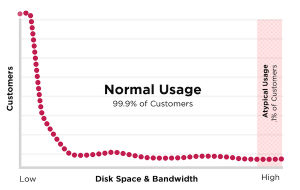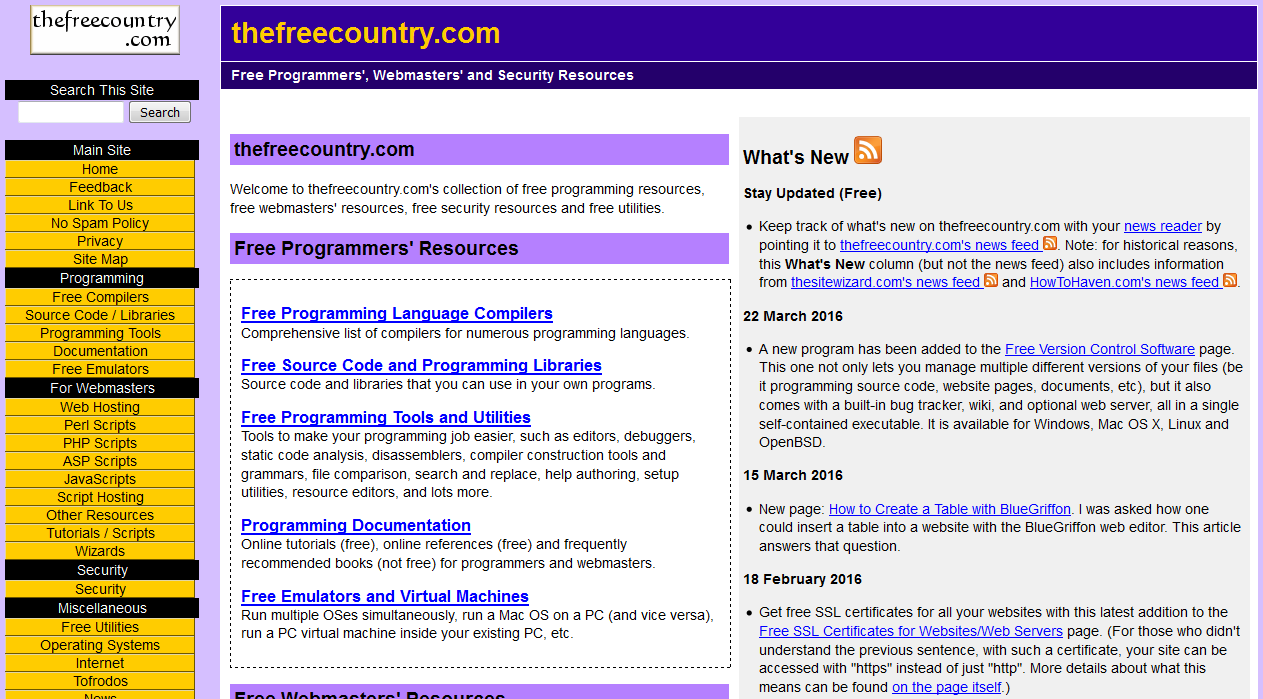At times, when the time comes to choose a web hosting plan for the website that you have, there are two critical components to have at the top of the priority list for the web hosting package to select; web storage size and data transfer. With pretty much a yearly cost of 100 dollars, a lot of web hosting servers give unlimited hosting plans. As the name expresses, these unlimited plans comprises of over the top web storage and data transfer. Be that as it may, being new at owning a site, is it important to have unlimited capacity?
While picking a web host, we regularly inspect a list of criteria, search for surveys and individual proposals, and even investigate the functions or offers offered by the forthcoming web has. In today’s present day sites, in any case, this usual way of doing things neglects to consider something that affect every developing webpage yet whose data can’t be found in the feature list of any web host: Resource usage limits.
Transfer speed and Disk Space are not often the Limiting Factor
Included clearly in each web host’s list of plans is the amount of disk space and activity (data transfer capacity) your website is allowed. Subsequently, most of the people who search for a web host prefer mostly on these things.

In any case, with more websites moving far from static pages to powerfully created pages, the greatest utmost reaches that you will face is not your transmission capacity or disk space, but rather what numerous web has uncertainly characterize as Resource use.
For those individuals who are not familiar with the terminology, static pages are simple HTML website pages like the vast majority of what you see on thesitewizard.com. The web server only shows what the pages contain with minimal additional work. Powerfully produced pages are what you get when you utilize blogging scripts like WordPress or Content Management Systems (CMS) like Drupal. The scripts gather your website page from a list of sources, for example, your database and your formats, each time somebody visits it.
What is the target of your new site?
If suppose the aim of your website is basically sharing stories, for example, a blog, it will for the most part add in content and perhaps a few pictures. For the most part, an article with 500 words includes 22KB. Thinking about this evaluation, you will require less than 1MB a month assuming you will have 30 month to month articles.
Considering the case given above, at most your site will utilize 1MB a month of hosting storage. What’s more, considering more than 800 month to month visitors, you will be confronting 800MB worth of traffic every month for the site.
What is the average supply of capacity and data transfer capacity for a free web hosting Provider?
Well, a free web hosting server gives 100MB of web storage and 1GB a month of traffic. In determination and differentiating data, a free web hosting provider need to be adequate for some person who is releasing another site.
The Real Resource Limits in Modern Web Hosting
There are three things normally considered under the keyword of “Resources” where web hosts are concerned. Two of these apply to all sites, and the third just to script-driven sites.
- CPU Usage
Whether a page is static or powerfully built, the web server’s CPU is utilized to acquire and convey the website page to your visitors. (Freely talking, a “CPU” is the part of a PC that capacities as its “brains”. It does every one of the calculations, handling, and starts whatever that is should have been done on a PC, practically equivalent to what brains do in the human body.) When a page is progressively made by a script, significantly more CPU cycles or resources are utilized, subsequent to the script has do a decent lot of preparing to reproduce your website page. It needs to stack the web format, get the information for that particular page from the database, execute the modules or modules that you have introduced, lastly collect the page for conveyance to the visitor.
Look at this below graph for your reference of CPU usage,

Since CPU time is a limited asset shared by all sites facilitated on a specific web server, if any one site exorbitantly uses the CPU, alternate destinations on that PC won’t have a chance to convey their pages in a convenient manner, and will show up either to be languid or non-responsive. Thusly, web has normally screen the measure of CPU your webpage uses on shared web hosting plans, to anticipate issues when a solitary site uses a lot of the CPU time, antagonistically influencing alternate sites on that server.
On the off chance that a webpage uses “an excess of CPU minutes” (in the speech of some web has), the web host will normally request that the proprietor move up to a more costly plan or get a devoted server, where the website is the one and only on that machine.
- RAM Usage
Most (if not all) web has let you know the amount of disk space has been dispensed to your website. In any case, presumably few shared web has let you know the amount of the framework RAM your webpage is permitted to utilize. In any case, RAM use is another farthest point that your site faces.
RAM is the makeshift memory that holds your site’s scripts and their information while they execute. Dissimilar to hard disk space, which web hosts can continue extending by including all the more hard circles utilizing an assortment of advancements, the most extreme measure of RAM a machine can have is altered. That measly measure of RAM is shared by all sites on that PC.
This memory is required by all projects that is keep running on the web server, including the server itself. On the off chance that your scripts are enormous, or they require a great deal of RAM to execute, they will be contending in that constrained pool of memory shared by all webstes and all projects. Accordingly, memory use is another part of web hosting that web has screen.
- Database Connections or MySQL Connections
The information for element sites is typically kept in extraordinary databases on the web host. A database server, for example, the mainstream MySQL server, deals with the database and gives the data asked for by the site’s scripts when they require it.
Database servers have a point of confinement on the quantity of connections they can acknowledge at any one time. At the point when an excess of connections for data are made at the same time, they come up short on resources and can’t benefit those connections. This regularly happens when your site gets a lot of traffic, or when you use a script that is not exceptionally effective (for instance, it makes an excess of links for each page it conveys), or both.
I’m certain you have seen mistake messages like “Can’t connect with MySQL server…” when you went to a few websites some time recently. The message implies that a script on that webpage was not able get certain data from the database that it expected to develop the site page. Possibly, the database server was, in that occasion, overwhelmed with solicitations and couldn’t benefit them.
Indeed, even Static Sites Face the Same Limits
Before you infer that you are safe to as far as possible on the off chance that you run a static site, reconsider. While you might not have any scripts inclining up the CPU and RAM use on your site, a surge of substantial activity will even now cause a CPU and RAM utilization point. In truth, that it takes significantly more movement for a static site to hit an asset limit than a progressively determined site, you will hit that farthest point at some point or another if your site is well known.
Result of the Resource Limits for Webmasters
Information of these asset points of confinement can help website admins in no less than two conceivable ways.
Assessing Web Hosts: The Web Hosting Gimmick
On the off chance that you visit the Budget Web Hosting pages on thefreecountry.com, you will without a doubt have seen some web has giving an absurdly colossal measure of transmission capacity for your site, with a few notwithstanding offering you unlimited data transfer.

Since you know about the “fine print” as said above, you will likely additionally have understood that you will never have the capacity to go through the greater part of the transfer speed you are given. Much sooner than you even achieve the sum you are as far as anyone knows allowed to use, your site will have hit its resource limits.
Note that I am not instructing you to stay away from such web has. I utilize a couple of them myself for a few sites. Maybe, I believe that when you assess a web host to put your webpage, you ought not give undue weight to data transfer capacity assignment, especially if that transmission capacity is too much extensive. While the measure of data transmission gave is constantly vital, in the event that you think about web has on that rule alone, you are misleading yourself. Each mutual web host has asset limits whether they state it or not. With those confines, your site will just develop such a great amount on a common host, whether you put it on hosts with bizarre data transfer capacity or on hosts with more rational transmission capacity stipends.
Arranging Your Website: Static Vs Dynamic
When you arrange your site, dependably take a gander at it in the long term. At times, however, the dynamic site made by such a system is a pointless excess. On the off chance that your site infrequently changes and just has a set number of pages, for example, is run of the mill in the event that you are just offering a specific item or a service, inquire as to whether it is in an ideal situation as a static site. As specified above, static platforms keep running into as far as possible slower than powerfully made websites.
Suppose your website needs to utilize blogging software or a content management system, then you have to arrange ahead for the time when you will never again have the capacity to utilize shared web hosting. In such circumstances, you will presumably need to put your site on a virtual private server (VPS) or a dedicated server. The last allows your site to use all the resources it needs since it will be the stand out on the server (unless you put different websites there). A VPS as a rule gives your site less resources to work with than a genuine dedicated server yet might be adequate if your site is just barely exceeding shared hosting.

